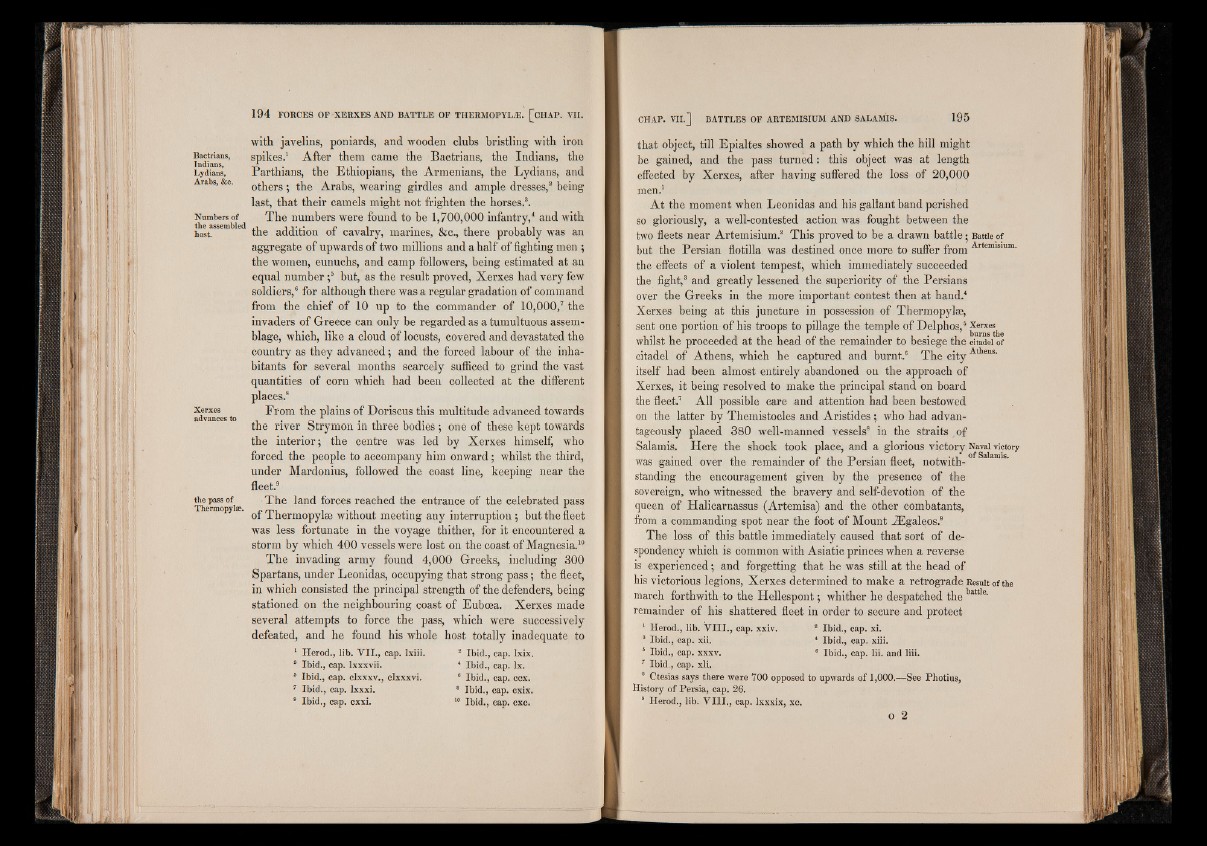
Bactrians,
Indians,
Lydians,
Arabs, &c.
Numbers o f
the assembled
host.
Xerxes
advances to
the pass of
Thermopylae.
with javelins, poniards, and wooden clubs bristling with iron
spikes.1 After them came the Bactrians, the Indians, the
Parthians, the Ethiopians, the Armenians, the Lydians, and
others; the Arabs, wearing girdles and ample dresses,2 being
last, that their camels might not frighten the horses.3.
The numbers were found to be 1,700,000 infantry,4 and with
the addition of cavalry, marines, &c., there probably was an
aggregate of upwards of two millions and a balf of fighting men ;
the women, eunuchs, and camp followers, being estimated at an
equal number ;5 but, as the result proved, Xerxes had very few
soldiers,6 for although there was a regular gradation of command
from the chief of 10 up to the commander of 10,000,’ the
invaders of Greece can only be regarded as a tumultuous assemblage,
which, like a cloud of locusts, covered and devastated the
country as they advanced; and the forced labour of the inhabitants
for several months scarcely sufficed to grind the vast
quantities of corn which had been collected at the different
places.8
From the plains of Doriscus this multitude advanced towards
the river Strymon in three bodies ; one of these kept towards
the interior; the centre was led by Xerxes himself, who
forced the people to accompany him onward; whilst the third,
under Mardonius, followed the coast line, keeping near the
fleet.9
The land forces reached the entrance of the celebrated pass
of Thermopylae without meeting any interruption; but the fleet
was less fortunate in the voyage thither, for it encountered a
storm by which 400 vessels were lost on the coast of Magnesia.10
The invading army found 4,000 Greeks, including 300
Spartans, under Leonidas, occupying that strong pass; the fleet,
in which consisted the principal strength of the defenders, being
stationed on the neighbouring coast of Euboea. Xerxes made
several attempts to force the pass, which were successively
defeated, and he found his whole host totally inadequate to
1 Herod., lib. "VII., cap. Ixiii. s Ibid., cap. lxix.
8 Ibid., cap. lxxxvii. 4 Ibid., cap. lx.
5 Ibid., cap. elxxxv., clxxxvi. 6 Ibid., cap. ccx.
7 Ibid., cap. lxxxi. 8 Ibid., cap. cxix.
8 Ibid., cap. cxxi. 10 Ibid., cap. cxc.
that object, till Epialtes showed a path by which the hill might
be gained, and the pass turned: this object was at length
effected by Xerxes, after having suffered the loss of 20,000
men.1
At the moment when Leonidas and his gallant band perished
so gloriously, a well-contested action was fought between the
two fleets near Artemisium.2 This proved to be a drawn battle; Battle of
but the Persian flotilla was destined once more to suffer from Artemisinm-
the effects of a violent tempest, which immediately succeeded
the fight,3 and greatly lessened the superiority of the Persians
over the Greeks in the more important contest then at hand.4
Xerxes being at this juncture in possession of Thermopylae,
sent one portion of his troops to pillage the temple of Delphos,5 ^erxe8h
whilst he proceeded at the head of the remainder to besiege the citadel of
citadel of Athens, which he captured and burnt..6 The cityAthens'
itself had been almost entirely abandoned on the approach of
Xerxes, it being resolved to make the principal stand on board
the fleet.7 All possible care and attention had been bestowed
on the latter by Themistocles and Aristides; who had advantageously
placed 380 well-manned vessels8 in the straits ,of
Salamis. Here the shock took place, and a glorious victory Naval victory
was gained over the remainder of the Persian fleet, notwithstanding
the encouragement given by the presence of the
| sovereign, who witnessed the bravery and self-devotion of the
queen of Halicarnassus (Artemisa) and the other combatants,
from a commanding spot near the foot of Mount Higaleos.9
The loss of this battle immediately caused that sort of despondency
which is common with Asiatic princes when a reverse
| is experienced; and forgetting that he was still at the head of
his victorious legions, Xerxes determined to make a retrograde Result of the
march forthwith to the Hellespont; whither he despatched the battle'
remainder of his shattered fleet in order to secure and protect
1 Herod., lib. V I I I ., cap. xxiv. 8 Ibid., cap. xi.
8 Ibid., cap. xii. 4 Ibid., cap. xiii.
8 Ibid., cap. xxxv. 8 Ibid., cap. lii. and liii.
7 Ibid., cap. xli.
8 Ctesias says there were 700 opposed to upwards of 1,000.—See Photius,
History of Persia, cap. 26.
“ Herod., lib. V I I I ., cap. lxxxix, xc.
o 2